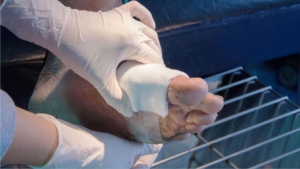 Diabetes affects approximately 30 million Americans and is a leading cause of diabetic foot ulcers (DFUs). These are painful open sores that can form on the feet due to nerve damage, poor circulation, or infection. It’s important to understand who is most at risk for developing a ulcer on their foot as well as the symptoms, treatments, and prevention strategies for avoiding them.
Diabetes affects approximately 30 million Americans and is a leading cause of diabetic foot ulcers (DFUs). These are painful open sores that can form on the feet due to nerve damage, poor circulation, or infection. It’s important to understand who is most at risk for developing a ulcer on their foot as well as the symptoms, treatments, and prevention strategies for avoiding them.
Diabetic foot care is a serious issue for those living with diabetes in Nashville, TN. Open sores or wounds can form on the feet and are caused by an accumulation of multiple risk factors, such as nerve damage, reduced sensation in the feet, poor blood circulation, and trauma from ill-fitting shoes. All these combined create a perfect environment for infection and further potential tissue damage that is both painful and disabling. For those living with diabetes already dealing with health issues, diabetic foot ulcers can be life-altering and must be managed cautiously and effectively to ensure the best possible outcome for recovery.
Table of Contents
Symptoms of Diabetes-Related Foot Wounds
The symptoms of an ulcer may include drainage from an open wound on the foot, redness and swelling around the affected area, and/or a foul odor if the wound is severe. If you experience any of these symptoms it’s important to seek medical attention right away.
Fungal foot infections are common and can cause some painful symptoms. Symptoms associated with fungal infection of the feet may include drainage on socks, redness and swelling around the affected area, and a strong smell if the infection has reached a severe level. Not only is it uncomfortable, but those suffering from this condition often become embarrassed to go barefoot in public or have someone touch their feet.
It’s important to get treatment for fungal infections as soon as possible before they spread further, as untreated foot fungus can further complicate existing medical conditions or create new ones. With early detection and proper medical care at one’s disposal, it is possible to successfully eliminate unwanted fungal problems of the feet.
Diabetic Foot Care Options for Nashville Patients
 When it comes to treating a Diabetic Foot Wound, there are several things that can be done. First, infection should be prevented by keeping the area clean and dry. Off-loading or taking pressure off the area is also important in order to allow it time to heal properly. Debridement may also be necessary in order to remove dead skin or tissue from the wound site. Applying medication or dressings can help reduce inflammation and speed up healing time. Finally, managing blood glucose levels and other health issues associated with diabetic foot care in Nashville, TN should be addressed in order to reduce your risk of further complications.
When it comes to treating a Diabetic Foot Wound, there are several things that can be done. First, infection should be prevented by keeping the area clean and dry. Off-loading or taking pressure off the area is also important in order to allow it time to heal properly. Debridement may also be necessary in order to remove dead skin or tissue from the wound site. Applying medication or dressings can help reduce inflammation and speed up healing time. Finally, managing blood glucose levels and other health issues associated with diabetic foot care in Nashville, TN should be addressed in order to reduce your risk of further complications.
The treatment of a diabetic foot ulcer can be complicated but is essential to improving the condition before it can worsen. A combination of preventive measures, off-loading the areas affected, and debridement are critical components that should be handled with care by medical professionals in the metro-Nashville area. To ensure the progress and healing of diabetic foot ulcers, there may need to be help from family members or nurses with administering prescribed medications or dressings. Furthermore, it is important to manage and continuously monitor blood glucose levels and other health conditions in order to manage these ulcers effectively. With these treatments better health can be achieved with time.

Diabetic Foot Care Strategy
The best way to prevent diabetic foot ulcers is by following some simple prevention strategies such as regular checkups with a podiatrist, proper foot care habits such as wearing appropriate shoes, inspecting feet regularly for irregularities and signs of injury, maintaining a healthy weight, exercising regularly, and limiting alcohol & tobacco use. By doing so you can drastically reduce your chances of developing a diabetic foot ulcer in the future.
Regular checkups with a foot doctor in Nashville, Tennessee along with adequate foot care are essential elements of preventing feet issues such as infection, injury, and pain. To ensure our feet stay in tip-top shape, it’s important to wear shoes that fit properly. That means no buying shoes based solely on size, we should consider the width and length for an appropriate fit. In addition, we should inspect our feet regularly during the day to monitor for irregularities like bruising, cuts or swelling. Following these simple tips can help us prevent potential discomforts from developing into severe issues later down the road.
Conclusion
Diabetic foot ulcers are painful open sores that can occur due to nerve damage, poor circulation or infection caused by diabetes. It’s important to understand who is most at risk for developing them, and also the various treatments available if they do occur. Additionally, following certain prevention strategies such as regular checkups with a podiatrist and proper foot care habits like wearing appropriate shoes can help reduce your risk of developing diabetic foot ulcers in the future. By being proactive about your health you can greatly improve your chances of avoiding this painful condition altogether!






